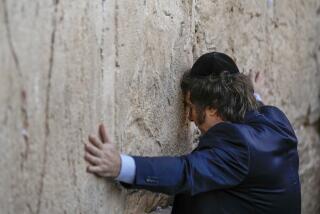Argentina Probes Arms-Ring Link to 1994 Jewish Center Bombing
- Share via
BUENOS AIRES — Argentine investigators hope that a black-market trail of stolen military arms will lead to terrorists who set off a powerful bomb at a Jewish community center here last year.
The explosion killed 86 people and demolished the seven-story building. Authorities have blamed the attack on Iranian-backed Muslim extremists; no one has been formally charged.
But new arrests this month have revealed that a judge and prosecutors are pursuing the possibility that explosives used to detonate the bomb may have been supplied by a ring trafficking in army weapons.
Prosecutor Eamon Mullen said Tuesday that the 14 people arrested--including seven Argentine noncommissioned officers on active duty--have been charged with illicit association and illegal possession of arms.
“There is some evidence that, in a way, leads to the suspicion that they could be linked to, or have knowledge of, whomever carried out the attack,” Mullen said.
He added in a telephone interview that the investigation into the trafficking ring’s connections is “just beginning” and that no proof has been found, so far, that its members had links to terrorists from the Middle East.
One of those detained is Jorge Pacifico, a cashiered army sergeant who belongs to a right-wing political party known as Modin. Investigators say Pacifico, an explosives expert, showed up at the Jewish community center on Pasteur Avenue minutes after it was destroyed in July 1994.
Judge Juan Juse Galeano, the investigating magistrate in the case, also ordered the detention of Emilio Pedro Morello, a former army captain and Modin’s secretary-general. But Morello is protected by congressional immunity from arrest.
Argentine press reports have said Galeano received wiretap reports linking Morello to the arms-trafficking ring. Morello denies any involvement.
Jewish organizations, including the Los Angeles-based Simon Wiesenthal Center, have urged Argentine authorities to investigate a “local connection” to the 1994 bombing. But Sergio Widder, the center’s representative in Argentina, said he still is not convinced of any link between arms traffickers and the bomb.
“I don’t criticize what Galeano is doing but neither can we be very optimistic,” Widder said Tuesday.
Widder recalled that Galeano has ordered many detentions since the terrorist bombing, but the case remains unsolved. Before this month’s arrests, the only suspect in custody was Carlos Telleldin, a former police officer of Arabic descent who has been accused of selling a Fiat van that was later turned into a car bomb.
Although Widder said he is waiting for proof of a connection between terrorists and Argentine security forces, he observed that anti-Jewish sentiment is not rare among Argentine military and police officials.
Some former members of the security forces have committed crimes such as kidnapping and extortion, and many victims have been Jewish, Widder said. He speculated that Mideast terrorists might have hired such renegade officials as mercenaries to carry out the 1994 bombing. “It might be the right track,” he said. “But we don’t have any proof of it.”
More to Read
Sign up for Essential California
The most important California stories and recommendations in your inbox every morning.
You may occasionally receive promotional content from the Los Angeles Times.












